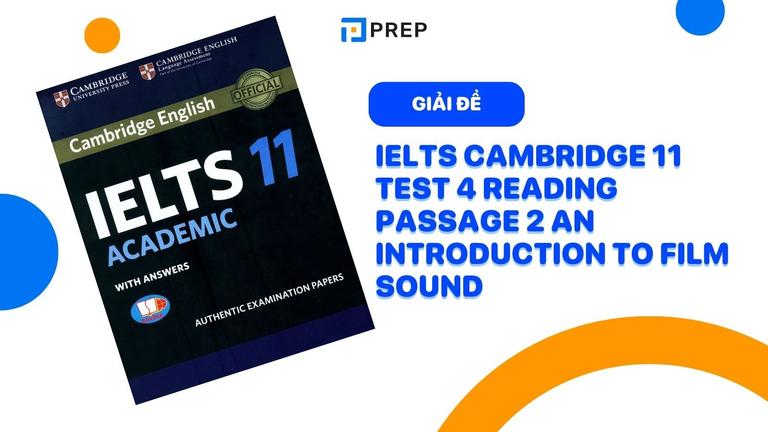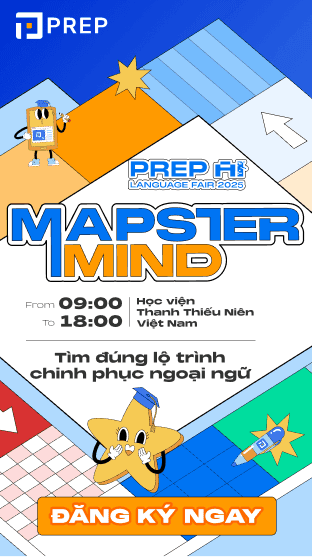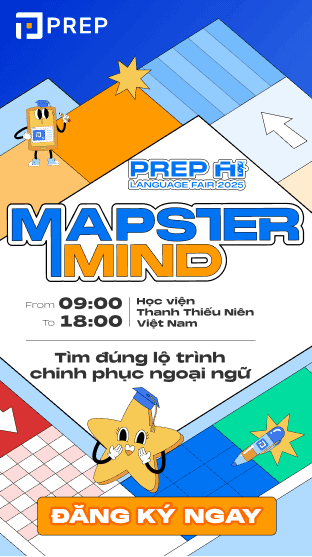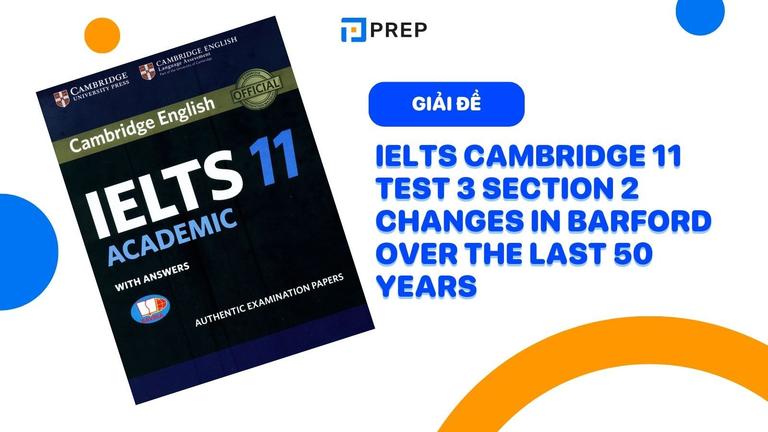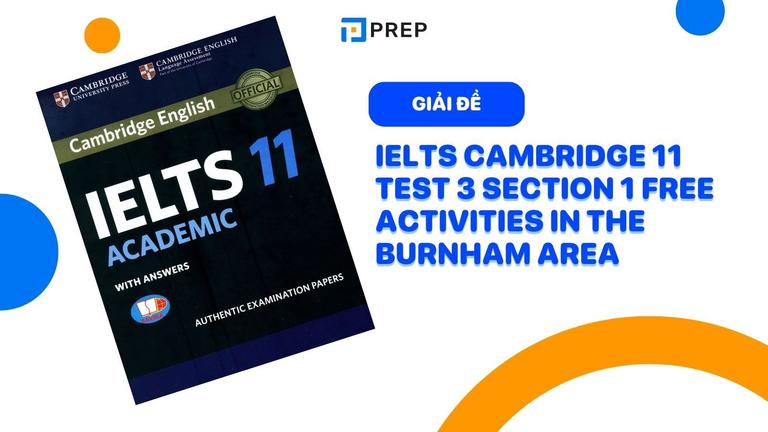Tongue twisters là gì? Luyện phát âm những câu tiếng Anh khó xoắn lưỡi
Tongue twisters là phương pháp luyện phát âm tiếng Anh hiệu quả. Trong bài viết hôm nay, PREP xin giới thiệu đến bạn chi tiết khái niệm Tongue twisters và cách luyện phát âm những câu nói tiếng Anh khó xoắn lưỡi, tham khảo ngay!
I. Tongue twister là gì?
Tongue twister là gì? Tongue twisters là các câu hoặc cụm từ được thiết kế để luyện tập phát âm vì chúng chứa nhiều âm thanh tương tự nhau hoặc âm thanh khó liên tiếp nhau, giúp người đọc luyện tập khả năng giao tiếp tiếng Anh mượt mà. Những câu nói líu lưỡi tiếng Anh này rất vui nhộn và thường được sử dụng trong các trò chơi ngôn ngữ hoặc trong các bài kiểm tra ngữ âm. Ví dụ:
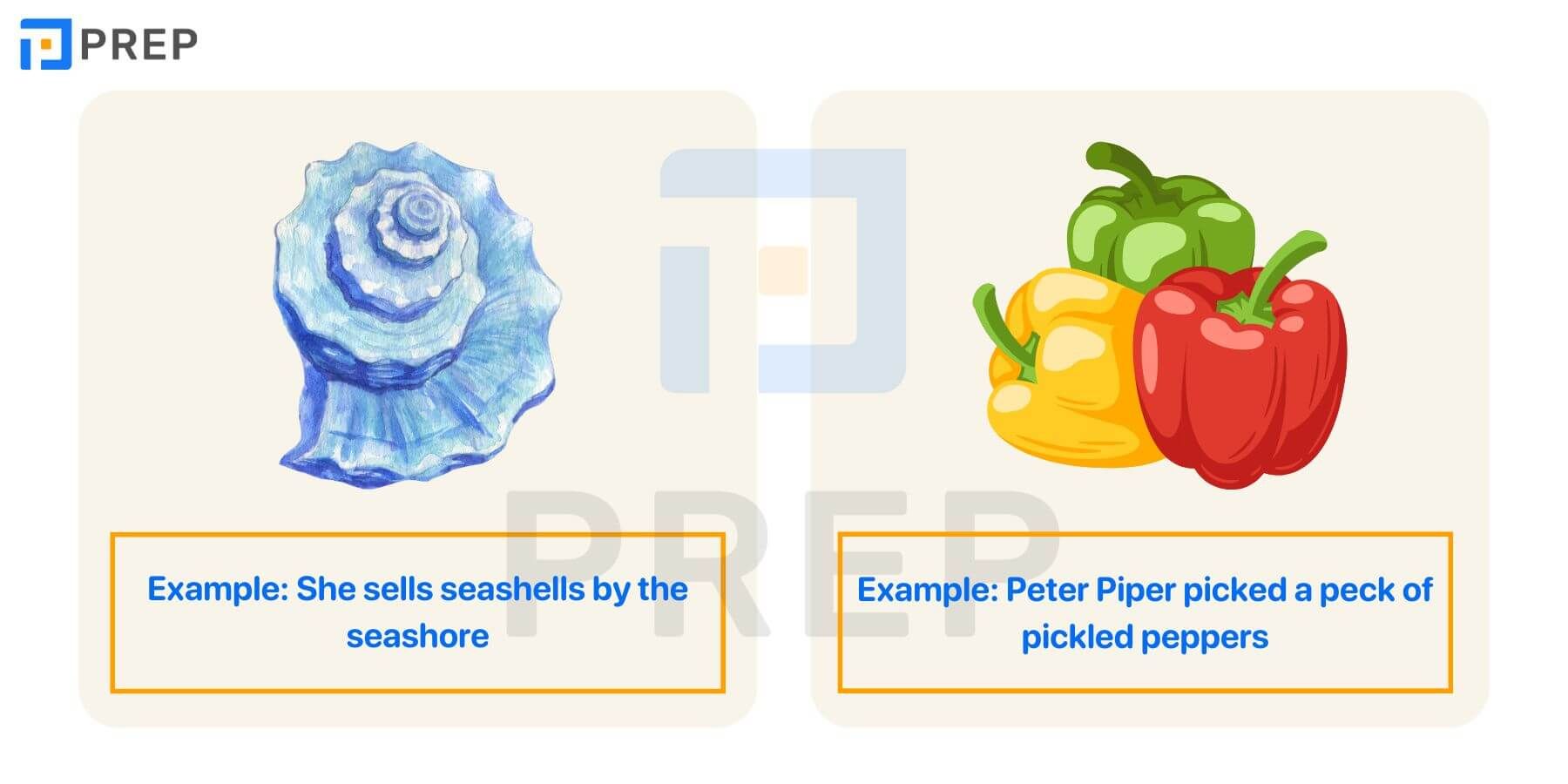
|
She sells seashells by the seashore |
/ʃi selz ˈsiːʃelz baɪ ðə ˈsiːʃɔːr/ |
[audio mp3="https://static-assets.prepcdn.com/content-management-system/Sub_Block_She_sells_seashells_by_the_sea_afd557da4b.mp3"][/audio] |
|
Peter Piper picked a peck of pickled peppers |
/ˈpiːtə ˈpaɪpər pɪkt ə pek ʌv ˈpɪkəld ˈpepərz/ |
[audio mp3="https://static-assets.prepcdn.com/content-management-system/Sub_Block_Peter_Piper_picked_a_peck_of_p_8b37c20f68.mp3"][/audio] |
II. Nguồn gốc của phương pháp Tongue twisters
Lịch sử của Tongue Twisters bắt nguồn từ nền văn hóa như Hy Lạp và La Mã và đã được truyền miệng qua các câu thơ hoặc bài hát qua nhiều thế hệ. Những câu nói này trở nên phổ biến trong giáo dục vào thế kỷ 19 và 20 như một công cụ giúp học sinh cải thiện kỹ năng phát âm và lưu loát.
Hiện nay, Tongue twisters được sử dụng rộng rãi trong các lớp học tiếng Anh nhằm giúp người học cải thiện kỹ năng phát âm.
III. Lợi ích và tầm quan trọng của phương pháp Tongue twisters
Tongue twisters mang lại nhiều lợi ích trong việc luyện tập phát âm tiếng Anh, cùng PREP tìm hiểu bạn nhé!
- Giúp luyện tập phát âm các âm thanh khó và âm thanh gần giống nhau trong tiếng Anh, người học có thể cải thiện sự chính xác và rõ ràng trong việc phát âm.
- Luyện tập với những câu nói xoắn lưỡi giúp cải thiện tốc độ và sự lưu loát khi nói. Việc lặp đi lặp lại các âm thanh trong Tongue twisters giúp tăng cường sự linh hoạt, dẻo dai của miệng và lưỡi, từ đó làm cho việc phát âm dễ dàng hơn và chính xác hơn.
- Khi luyện tập những câu nói líu lưỡi tiếng Anh, người học cũng phải chú ý đến các âm thanh và cách chúng thay đổi trong các câu, từ đó cải thiện khả năng nghe.
- Ngoài ứng dụng trong việc học Tongue twisters là một hoạt động vui nhộn và giảm căng thẳng, giúp người học cảm thấy thoải mái và thư giãn hơn khi luyện tập phát âm. Tongue twisters cũng được sử dụng trong các trò chơi và hoạt động giải trí.
IV. Luyện đọc những câu tiếng Anh líu lưỡi
Dưới đây PREP xin chia sẻ đến bạn các câu nói Tongue twisters căn bản, dài và khó cùng hài hước, tham khảo ngay!
1. Tongue twisters ngắn theo bảng chữ cái
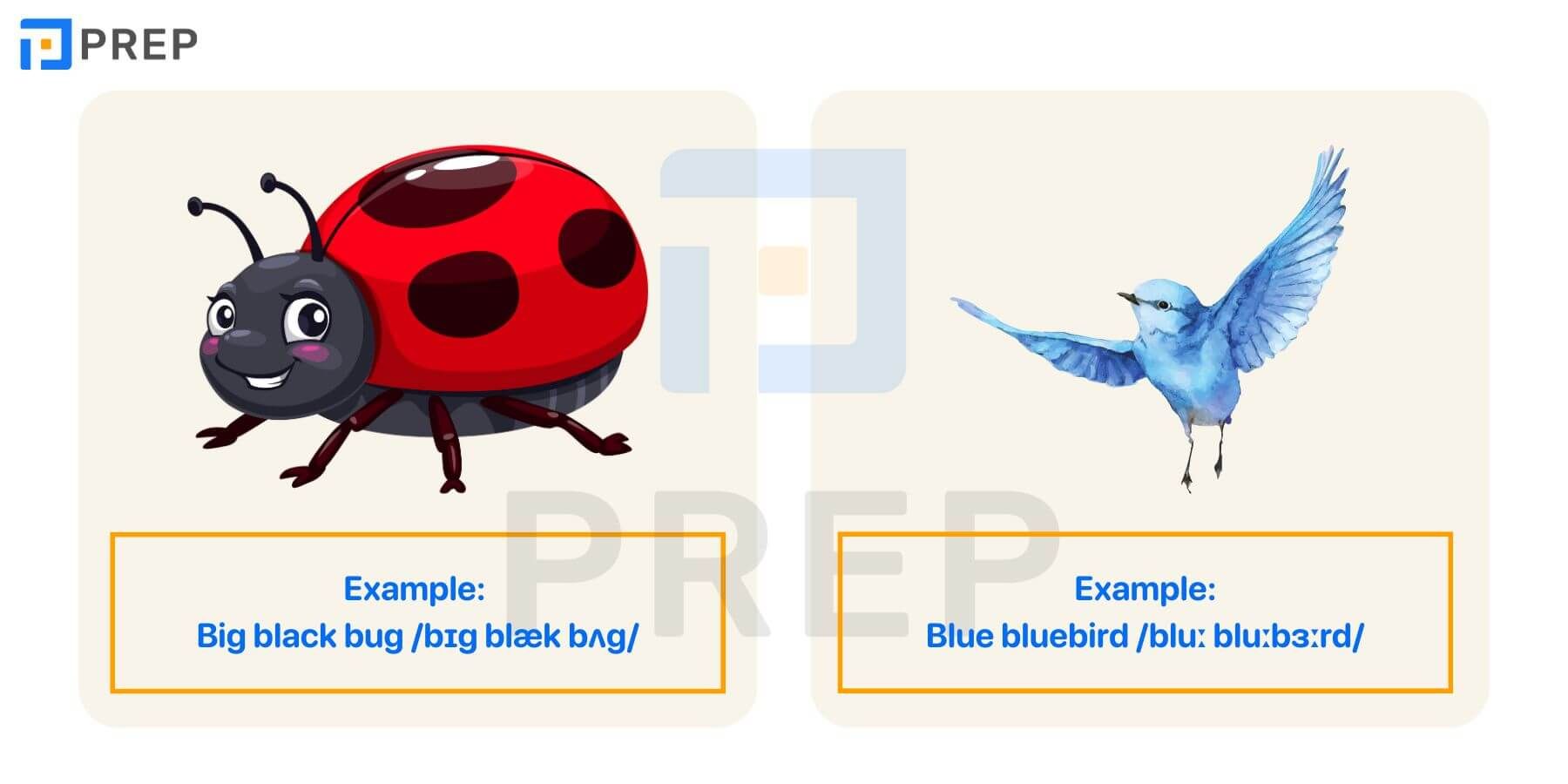
|
STT |
Những câu tiếng Anh khó |
Audio |
|
1 |
Big black bug /bɪɡ blæk bʌɡ/ |
[audio mp3="https://static-assets.prepcdn.com/content-management-system/Sub_Block_Big_black_bug_bc317337fd.mp3"][/audio] |
|
2 |
Blue bluebird /bluː bluːbɜːrd/ |
[audio mp3="https://static-assets.prepcdn.com/content-management-system/Sub_Block_Blue_bluebird_c4edab9123.mp3"][/audio] |
|
3 |
Bye bye /baɪ baɪ/ |
[audio mp3="https://static-assets.prepcdn.com/content-management-system/Sub_Block_Bye_bye_721797595b.mp3"][/audio] |
|
4 |
Cup of coffee /kʌp əv ˈkɔːfi/ |
[audio mp3="https://static-assets.prepcdn.com/content-management-system/Sub_Block_Cup_of_coffee_d2fc73f098.mp3"][/audio] |
|
5 |
Eleven elves /ɪˈlevən elvz/ |
[audio mp3="https://static-assets.prepcdn.com/content-management-system/Sub_Block_Eleven_elves_a416f3c697.mp3"][/audio] |
|
6 |
Fresh fried fish /freʃ fraɪd fɪʃ/ |
[audio mp3="https://static-assets.prepcdn.com/content-management-system/Sub_Block_Fresh_fried_fish_a894eac423.mp3"][/audio] |
|
7 |
Friendly fleas and fireflies /ˈfrendli fliːz ənd ˈfaɪərflaɪz/ |
[audio mp3="https://static-assets.prepcdn.com/content-management-system/Sub_Block_Friendly_fleas_and_fireflies_da34bb3530.mp3"][/audio] |
|
8 |
Greek grapes /ɡriːk ɡreɪps/ |
[audio mp3="https://static-assets.prepcdn.com/content-management-system/Sub_Block_Greek_grapes_b58b4ade7e.mp3"][/audio] |
|
9 |
I scream, you scream /aɪ skriːm, juː skriːm/ |
[audio mp3="https://static-assets.prepcdn.com/content-management-system/Sub_Block_I_scream_you_scream_bc26f124a2.mp3"][/audio] |
|
10 |
Kitten in the kitchen /ˈkɪtn ɪn ðə ˈkɪtʃɪn/ |
[audio mp3="https://static-assets.prepcdn.com/content-management-system/Sub_Block_Kitten_in_the_kitchen_64532aa666.mp3"][/audio] |
|
11 |
Quick kiss /kwɪk kɪs/ |
[audio mp3="https://static-assets.prepcdn.com/content-management-system/Sub_Block_Quick_kiss_e7796e7285.mp3"][/audio] |
|
12 |
Red leather, yellow leather /red ˈleðər, ˈjeloʊ ˈleðər/ |
[audio mp3="https://static-assets.prepcdn.com/content-management-system/Sub_Block_Red_leather_yellow_leather_f3ac4f1ffa.mp3"][/audio] |
|
13 |
Red lorry, yellow lorry /red ˈlɒri, ˈjeloʊ ˈlɒri/ |
[audio mp3="https://static-assets.prepcdn.com/content-management-system/Sub_Block_Red_lorry_yellow_lorry_641253f0b4.mp3"][/audio] |
|
14 |
She sells seashells /ʃiː selz ˈsiːʃelz/ |
[audio mp3="https://static-assets.prepcdn.com/content-management-system/Sub_Block_She_sells_seashells_39d374e62b.mp3"][/audio] |
|
15 |
Six thin things /sɪks θɪn θɪŋz/ |
[audio mp3="https://static-assets.prepcdn.com/content-management-system/Sub_Block_Six_thin_things_6f3cec5d2f.mp3"][/audio] |
|
16 |
The big bug bit the little beetle /ðə bɪɡ bʌɡ bɪt ðə ˈlɪtəl ˈbiːtl/ |
[audio mp3="https://static-assets.prepcdn.com/content-management-system/Sub_Block_The_big_bug_bit_the_little_bee_84cf674e4e.mp3"][/audio] |
|
17 |
These things /ðiːz θɪŋz/ |
[audio mp3="https://static-assets.prepcdn.com/content-management-system/Sub_Block_Six_thin_things_6f3cec5d2f.mp3"][/audio] |
|
18 |
Three free throws /θriː friː θroʊz/ |
[audio mp3="https://static-assets.prepcdn.com/content-management-system/Sub_Block_Three_free_throws_0245cf5ef5.mp3"][/audio] |
|
19 |
Toy phone /tɔɪ foʊn/ |
[audio mp3="https://static-assets.prepcdn.com/content-management-system/Sub_Block_Toy_phone_d341f8cc2e.mp3"][/audio] |
|
20 |
Tricky, frisky snake /ˈtrɪki, ˈfrɪski sneɪk/ |
[audio mp3="https://static-assets.prepcdn.com/content-management-system/Sub_Block_Tricky_frisky_snake_e4317c7003.mp3"][/audio] |
|
21 |
Two witches /tuː ˈwɪtʃɪz/ |
[audio mp3="https://static-assets.prepcdn.com/content-management-system/Sub_Block_Two_witches_99edd6fef2.mp3"][/audio] |
|
22 |
Whether the weather /ˈweðər ðə ˈweðər/ |
[audio mp3="https://static-assets.prepcdn.com/content-management-system/Sub_Block_Whether_the_weather_7b7ec3d0b2.mp3"][/audio] |
|
23 |
Wood would /wʊd wʊd/ |
[audio mp3="https://static-assets.prepcdn.com/content-management-system/Sub_Block_Wood_would_35ecc47927.mp3"][/audio] |
|
24 |
Zebras zig /ˈziːbrəz zɪɡ/ |
[audio mp3="https://static-assets.prepcdn.com/content-management-system/Sub_Block_Zebras_zig_4437644ea5.mp3"][/audio] |
2. Tongue twisters dài
|
STT |
Những câu tiếng Anh khó |
Phiên âm IPA |
Audio |
|
1 |
Pad kid poured curd pulled cod. |
/pæd kɪd pʊəd kɜːrd pʊld kɒd./ |
[audio mp3="https://static-assets.prepcdn.com/content-management-system/Sub_Block_Pad_kid_poured_curd_pulled_cod_f8777a6774.mp3"][/audio] |
|
2 |
If you must cross a course cross cow across a crowded cow crossing, cross the cross coarse cow across the crowded cow crossing carefully. |
/ɪf juː mʌst krɒs ə kɔːs krɒs kaʊ əkrɒs ə ˈkraʊdɪd kaʊ ˈkrɒsɪŋ, krɒs ðə krɒs kɔːrs kaʊ əkrɒs ðə ˈkraʊdɪd kaʊ ˈkrɒsɪŋ ˈkeəfəli./ |
[audio mp3="https://static-assets.prepcdn.com/content-management-system/Sub_Block_If_you_must_cross_a_course_cro_1ac903f0aa.mp3"][/audio] |
|
3 |
Brisk brave brigadiers brandished broad bright blades, blunderbusses, and bludgeons — balancing them badly. |
/brɪsk breɪv brɪɡəˈdɪəz ˈbrændɪʃt brɔːd braɪt bleɪdz, ˈblʌndəˌbʌsɪz, ənd ˈblʌdʒənz — ˈbælənst ðem ˈbædli./ |
[audio mp3="https://static-assets.prepcdn.com/content-management-system/Sub_Block_Brisk_brave_brigadiers_brandis_1_0fe7d06850.mp3"][/audio] |
|
4 |
Six sick hicks nick six slick bricks with picks and sticks. |
/sɪks sɪk hɪks nɪk sɪks slɪk brɪks wɪð pɪks ənd stɪks./ |
[audio mp3="https://static-assets.prepcdn.com/content-management-system/Sub_Block_Six_sick_hicks_nick_six_slick_81b3ebaaab.mp3"][/audio] |
|
5 |
Can you can a canned can into an un-canned can like a canner can can a canned can into an un-canned can? |
/kæn juː kæn ə kænd kæn ˈɪntuː æn ʌnˈkænd kæn laɪk ə ˈkænər kæn kæn ə kænd kæn ˈɪntuː æn ʌnˈkænd kæn?/ |
[audio mp3="https://static-assets.prepcdn.com/content-management-system/Sub_Block_Can_you_can_a_canned_can_into_5157d246ca.mp3"][/audio] |
|
6 |
The sixth sick sheikh’s sixth sheep’s sick. |
/ðə sɪksθ sɪk ʃeɪk’s sɪksθ ʃiːp’s sɪk./ |
[audio mp3="https://static-assets.prepcdn.com/content-management-system/Sub_Block_The_sixth_sick_sheikhs_sixth_d4858a66a7.mp3"][/audio] |
|
7 |
Rory the warrior and Roger the worrier were reared wrongly in a rural brewery. |
/ˈrɔːri ðə ˈwɔːriər ənd ˈrɒdʒər ðə ˈwɜːriər wɜːr rɪəd ˈrɒŋli ɪn ə ˈrʊrəl ˈbruːəri/ |
[audio mp3="https://static-assets.prepcdn.com/content-management-system/Sub_Block_Rory_the_warrior_and_Roger_the_880ae94573.mp3"][/audio] |
|
8 |
Ingenious iguanas improvising an intricate impromptu on impossibly-impractical instruments. |
/ɪnˈdʒiːniəs ɪˈɡwɑːnəz ˌɪmprəˈvaɪzɪŋ æn ˈɪntrɪkət ˌɪmprɒmpˈtjuː ɒn ɪmˈpɒsɪbliː ɪmˈpræktɪkəl ˈɪnstrumənts./ |
[audio mp3="https://static-assets.prepcdn.com/content-management-system/Sub_Block_Ingenious_iguanas_improvising_1f167c9f86.mp3"][/audio] |
|
9 |
I saw Susie sitting in a shoe shine shop. Where she shines, she sits, and where she sits, she shines. |
/aɪ sɔː ˈsuːzi ˈsɪtɪŋ ɪn ə ʃuː ʃaɪn ʃɒp. weə ʃiː ʃaɪnz, ʃiː sɪts, ənd weə ʃiː sɪts, ʃiː ʃaɪnz./
|
[audio mp3="https://static-assets.prepcdn.com/content-management-system/Sub_Block_I_saw_Susie_sitting_in_a_shoe_849eaa8aad.mp3"][/audio] |
|
10 |
When a doctor doctors a doctor, does the doctor doing the doctoring doctor as the doctor being doctored wants to be doctored or does the doctor doing the doctoring doctor as he wants to doctor? |
/wen ə ˈdɒktər ˈdɒktəz ə ˈdɒktər, dʌz ðə ˈdɒktər ˈduːɪŋ ðə ˈdɒktərɪŋ ˈdɒktər æz ðə ˈdɒktər ˈbiːɪŋ ˈdɒktəd wɒnts tə biː ˈdɒktəd ɔːr dʌz ðə ˈdɒktər ˈduːɪŋ ðə ˈdɒktərɪŋ ˈdɒktər æz hiː wɒnts tə ˈdɒktər?/ |
[audio mp3="https://static-assets.prepcdn.com/content-management-system/Sub_Block_When_a_doctor_doctors_a_doctor_a1ce1533db.mp3"][/audio] |
|
11 |
These thousand tricky tongue twisters trip thrillingly off the tongue. |
/ðiːz ˈθaʊzənd ˈtrɪki tʌŋ ˈtwɪstəz trɪp ˈθrɪlɪŋli ɒf ðə tʌŋ./ |
[audio mp3="https://static-assets.prepcdn.com/content-management-system/Sub_Block_These_thousand_tricky_tongue_t_0a125bb657.mp3"][/audio] |
|
12 |
Thirty-three thirsty, thundering thoroughbreds thumped Mr. Thurber on Thursday. |
/ˈθɜːti θriː ˈθɜːsti, ˈθʌndərɪŋ ˈθʌrəʊbredz θʌmpt ˈmɪstər ˈθɜːrbər ɒn ˈθɜːrzdeɪ./ |
[audio mp3="https://static-assets.prepcdn.com/content-management-system/Sub_Block_Thirty_three_thirsty_thunderi_9f102080e0.mp3"][/audio] |
|
13 |
Brisk brave brigadiers brandished broad bright blades, blunderbusses, and bludgeons—balancing them badly. |
/brɪsk breɪv brɪɡəˈdɪəz ˈbrɔːd braɪt bleɪdz, ˈblʌndəˌbʌsɪz, ənd ˈblʌdʒənz—ˈbælənst ðem ˈbædli./ |
[audio mp3="https://static-assets.prepcdn.com/content-management-system/Sub_Block_Brisk_brave_brigadiers_brandis_1_0fe7d06850.mp3"][/audio] |
|
14 |
A skunk sat on a stump and thunk the stump stunk, but the stump thunk the skunk stunk. |
/ə skʌŋk sæt ɒn ə stʌmp ənd θʌŋk ðə stʌmp stʌŋk, bʌt ðə stʌmp θʌŋk ðə skʌŋk stʌŋk./ |
[audio mp3="https://static-assets.prepcdn.com/content-management-system/Sub_Block_A_skunk_sat_on_a_stump_and_thu_821e9f5c17.mp3"][/audio] |
|
15 |
Give papa a cup of proper coffee in a copper coffee cup. |
/ɡɪv ˈpɑːpə ə kʌp əv ˈprɒpər ˈkɒfi ɪn ə ˈkɒpər ˈkɒfi kʌp./ |
[audio mp3="https://static-assets.prepcdn.com/content-management-system/Sub_Block_Give_papa_a_cup_of_proper_coff_ae35498c85.mp3"][/audio] |
|
16 |
He threw three free throws. |
/hiː θruː θriː friː θrəʊz./ |
[audio mp3="https://static-assets.prepcdn.com/content-management-system/Sub_Block_He_threw_three_free_throws_dbe4c21c0c.mp3"][/audio] |
|
17 |
Near an ear, a nearer ear, a nearly eerie ear. |
/nɪə(r) ən ɪə(r), ə ˈnɪərə ɪə(r), ə ˈnɪəli ˈɪəri ɪə(r)./ |
[audio mp3="https://static-assets.prepcdn.com/content-management-system/Sub_Block_Near_an_ear_a_nearer_ear_a_n_5489507ec1.mp3"][/audio] |
|
18 |
Many an anemone sees an enemy anemone. |
/ˈmeni æn əˈneməni siːz æn ˈenəmi əˈneməni./ |
[audio mp3="https://static-assets.prepcdn.com/content-management-system/Sub_Block_Many_an_anemone_sees_an_enemy_2f341b35e2.mp3"][/audio] |
|
19 |
Chop shops stock chops. |
/ʧɒp ʃɒps stɒk ʧɒps./ |
[audio mp3="https://static-assets.prepcdn.com/content-management-system/Sub_Block_Chop_shops_stock_chops_33d1c3914d.mp3"][/audio] |
3. Tongue twisters hài hước, vui nhộn
|
STT |
Những câu tiếng Anh khó |
Phiên âm IPA |
Audio |
|
1 |
Peter Piper picked a peck of pickled peppers; A peck of pickled peppers Peter Piper picked; If Peter Piper picked a peck of pickled peppers, Where’s the peck of pickled peppers Peter Piper picked. |
/ˈpiːtər ˈpaɪpər pɪkt ə pek əv ˈpɪkəld ˈpepəz; ə pek əv ˈpɪkəld ˈpepəz ˈpiːtər ˈpaɪpər pɪkt; ɪf ˈpiːtər ˈpaɪpər pɪkt ə pek əv ˈpɪkəld ˈpepəz, weəz ðə pek əv ˈpɪkəld ˈpepəz ˈpiːtər ˈpaɪpər pɪkt./ |
[audio mp3="https://static-assets.prepcdn.com/content-management-system/Sub_Block_Peter_Piper_picked_a_peck_of_p_c2c5db1688.mp3"][/audio] |
|
2 |
How much wood would a woodchuck chuck if a woodchuck could chuck wood? He would chuck, he would, as much as he could, and chuck as much wood as a woodchuck would if a woodchuck could chuck wood. |
/haʊ mʌʧ wʊd wʊd ə wʊdʧʌk ʧʌk ɪf ə wʊdʧʌk kʊd ʧʌk wʊd? hi wʊd ʧʌk, hi wʊd, æz mʌʧ æz hi kʊd, ænd ʧʌk æz mʌʧ wʊd æz ə wʊdʧʌk wʊd ɪf ə wʊdʧʌk kʊd ʧʌk wʊd./ |
[audio mp3="https://static-assets.prepcdn.com/content-management-system/Sub_Block_How_much_ground_would_a_ground_d3b87f9088.mp3"][/audio] |
|
3 |
She sells seashells on the seashore. The shells she sells are seashells, I’m sure. And if she sells seashells on the seashore, Then I’m sure she sells seashore shells. |
/ʃiː selz ˈsiːʃɛlz ɒn ðə ˈsiːʃɔːr. ðə ʃɛlz ʃiː sɛlz ɑːr ˈsiːʃɛlz, aɪm ʃʊə. ænd ɪf ʃiː sɛlz ˈsiːʃɛlz ɒn ðə ˈsiːʃɔːr, ðɛn aɪm ʃʊə ʃiː sɛlz ˈsiːʃɔːr ʃɛlz./ |
[audio mp3="https://static-assets.prepcdn.com/content-management-system/Sub_Block_She_sells_seashells_on_the_sea_2715a05a41.mp3"][/audio] |
|
4 |
Birdie birdie in the sky laid a turdie in my eye. If cows could fly I’d have a cow pie in my eye. |
/ˈbɜːrdi ˈbɜːrdi ɪn ðə skaɪ leɪd ə ˈtɜːrdi ɪn maɪ aɪ./ /ɪf kaʊz kʊd flaɪ aɪd hæv ə kaʊ paɪ ɪn maɪ aɪ./ |
[audio mp3="https://static-assets.prepcdn.com/content-management-system/Sub_Block_Birdie_birdie_in_the_sky_laid_04d88f3e63.mp3"][/audio] |
|
5 |
How much ground would a groundhog hog, if a groundhog could hog ground? A groundhog would hog all the ground he could hog, if a groundhog could hog ground. |
/haʊ mʌʧ ɡraʊnd wʊd ə ˈɡraʊndhɒɡ hɒɡ, ɪf ə ˈɡraʊndhɒɡ kʊd hɒɡ ɡraʊnd? ə ˈɡraʊndhɒɡ wʊd hɒɡ ɔːl ðə ɡraʊnd hi kʊd hɒɡ, ɪf ə ˈɡraʊndhɒɡ kʊd hɒɡ ɡraʊnd./ |
[audio mp3="https://static-assets.prepcdn.com/content-management-system/Sub_Block_How_much_ground_would_a_ground_d3b87f9088.mp3"][/audio] |
|
6 |
Yellow butter, purple jelly, red jam, black bread. Spread it thick, say it quick! Yellow butter, purple jelly, red jam, black bread. Spread it thicker, say it quicker! Yellow butter, purple jelly, red jam, black bread. Don’t eat with your mouth full! |
/ˈjɛloʊ ˈbʌtə(r), ˈpɜːrpl ˈdʒɛli, rɛd dʒæm, blæk brɛd. sprɛd ɪt θɪk, seɪ ɪt kwɪk! ˈjɛloʊ ˈbʌtə(r), ˈpɜːrpl ˈdʒɛli, rɛd dʒæm, blæk brɛd. sprɛd ɪt ˈθɪkər, seɪ ɪt ˈkwɪkər! ˈjɛloʊ ˈbʌtə(r), ˈpɜːrpl ˈdʒɛli, rɛd dʒæm, blæk brɛd. doʊnt iːt wɪð jʊər maʊθ fʊl!/ |
[audio mp3="https://static-assets.prepcdn.com/content-management-system/Sub_Block_Yellow_butter_purple_jelly_r_80bd5577c6.mp3"][/audio] |
|
7 |
I slit the sheet, the sheet I slit, and on the slitted sheet I sit. |
/aɪ slɪt ðə ʃiːt, ðə ʃiːt aɪ slɪt, ænd ɒn ðə ˈslɪtɪd ʃiːt aɪ sɪt./ |
[audio mp3="https://static-assets.prepcdn.com/content-management-system/Sub_Block_I_slit_the_sheet_the_sheet_I_e3c0e0a189.mp3"][/audio] |
|
8 |
Luke Luck likes lakes. Luke’s duck likes lakes. Luke Luck licks lakes. Luck’s duck licks lakes. Duck takes licks in lakes Luke Luck likes. Luke Luck takes licks in lakes duck likes. |
/luːk lʌk laɪks leɪks. luːk's dʌk laɪks leɪks. luːk lʌk lɪks leɪks. lʌk's dʌk lɪks leɪks. dʌk teɪks lɪks ɪn leɪks luːk lʌk laɪks. luːk lʌk teɪks lɪks ɪn leɪks dʌk laɪks./ |
[audio mp3="https://static-assets.prepcdn.com/content-management-system/Sub_Block_Luke_Luck_likes_lakes_Lukes_d9d52f1fcd.mp3"][/audio] |
4. Tongue twisters khó
|
STT |
Những câu tiếng Anh khó |
Phiên âm IPA |
Audio |
|
1 |
All I want is a proper cup of coffee. Made in a proper copper coffee pot. You can believe it or not. But I want a cup of coffee from a proper copper pot. Tin coffee pots or iron coffee pots, they’re not good to me. If I can’t have a proper cup of coffee from a proper copper coffee pot, I’ll just have tea. All I want is a proper cup of coffee. Made in a proper copper coffee pot. You can believe it or not. But I want a cup of coffee from a proper copper pot. |
/ɔːl aɪ wɒnt ɪz ə ˈprɒpər kʌp əv ˈkɒfi/ /meɪd ɪn ə ˈprɒpər ˈkɒpər ˈkɒfi pɒt/ /juː kæn bɪˈliːv ɪt ɔːr nɒt/ /bʌt aɪ wɒnt ə kʌp əv ˈkɒfi frəm ə ˈprɒpər ˈkɒpər pɒt/ /tɪn ˈkɒfi pɒts ɔːr ˈaɪən ˈkɒfi pɒts, ðeər nɒt ɡʊd tə miː/ /ɪf aɪ kɑːnt hæv ə ˈprɒpər kʌp əv ˈkɒfi frəm ə ˈprɒpər ˈkɒpər ˈkɒfi pɒt, aɪl dʒʌst hæv tiː/ /ɔːl aɪ wɒnt ɪz ə ˈprɒpər kʌp əv ˈkɒfi/ /meɪd ɪn ə ˈprɒpər ˈkɒpər ˈkɒfi pɒt/ /juː kæn bɪˈliːv ɪt ɔːr nɒt/ /bʌt aɪ wɒnt ə kʌp əv ˈkɒfi frəm ə ˈprɒpər ˈkɒpər pɒt/ |
[audio mp3="https://static-assets.prepcdn.com/content-management-system/Sub_Block_All_I_want_is_a_proper_cup_of_5b037f6edd.mp3"][/audio] |
|
2 |
To sit in solemn silence in a dull, dark dock, In a pestilential prison, with a life-long lock, Awaiting the sensation of a short, sharp shock, From a cheap and chippy chopper on a big black block! To sit in solemn silence in a dull, dark dock, In a pestilential prison, with a life-long lock, Awaiting the sensation of a short, sharp shock, From a cheap and chippy chopper on a big black block! A dull, dark dock, a life-long lock, A short, sharp shock, a big black block! To sit in solemn silence in a pestilential prison, And awaiting the sensation. From a cheap and chippy chopper on a big black block! |
/tə sɪt ɪn ˈsɒləm ˈsaɪləns ɪn ə dʌl, dɑːk dɒk, ɪn ə ˌpɛstɪˈlɛnʃəl ˈprɪzən, wɪð ə ˈlaɪf-lɒŋ lɒk, əˈweɪtɪŋ ðə ˌsɛnˈseɪʃən əv ə ʃɔːrt, ʃɑːrp ʃɒk, frəm ə ʧiːp ənd ˈʧɪpi ˈʧɒpər ɒn ə bɪɡ blæk blɒk!/ /tə sɪt ɪn ˈsɒləm ˈsaɪləns ɪn ə dʌl, dɑːk dɒk, ɪn ə ˌpɛstɪˈlɛnʃəl ˈprɪzən, wɪð ə ˈlaɪf-lɒŋ lɒk, əˈweɪtɪŋ ðə ˌsɛnˈseɪʃən əv ə ʃɔːrt, ʃɑːrp ʃɒk, frəm ə ʧiːp ənd ˈʧɪpi ˈʧɒpər ɒn ə bɪɡ blæk blɒk!/ /ə dʌl, dɑːk dɒk, ə ˈlaɪf-lɒŋ lɒk, ə ʃɔːrt, ʃɑːrp ʃɒk, ə bɪɡ blæk blɒk!/ /tə sɪt ɪn ˈsɒləm ˈsaɪləns ɪn ə ˌpɛstɪˈlɛnʃəl ˈprɪzən, ænd əˈweɪtɪŋ ðə ˌsɛnˈseɪʃən frəm ə ʧiːp ənd ˈʧɪpi ˈʧɒpər ɒn ə bɪɡ blæk blɒk!/ |
[audio mp3="https://static-assets.prepcdn.com/content-management-system/Sub_Block_To_sit_in_solemn_silence_in_a_e5fe8d2eb7.mp3"][/audio] |
|
3 |
Betty Botter bought some butter but, said she, the butter’s bitter. If I put it in my batter, it will make my batter bitter. But a bit of better butter will make my bitter batter better. So she bought some better butter, better than the bitter butter, put it in her bitter batter, made her bitter batter better. So ‘t was better Betty Botter bought some better butter. |
/ˈbɛti ˈbɒtə bɔːt səm ˈbʌtə bʌt, sɛd ʃiː, ðə ˈbʌtəz ˈbɪtə/ /ɪf aɪ pʊt ɪt ɪn maɪ ˈbætər, ɪt wɪl meɪk maɪ ˈbætər ˈbɪtə/ /bʌt ə bɪt əv ˈbɛtər ˈbʌtə wɪl meɪk maɪ ˈbɪtə ˈbætər ˈbɛtə/ /səʊ ʃiː bɔːt səm ˈbɛtər ˈbʌtə, ˈbɛtər ðæn ðə ˈbɪtə ˈbʌtə,/ /pʊt ɪt ɪn hɜːr ˈbɪtə ˈbætər, meɪd hɜːr ˈbɪtə ˈbætər ˈbɛtə/ /səʊ twəz ˈbɛtə ˈbɛti ˈbɒtə bɔːt səm ˈbɛtər ˈbʌtə/ |
[audio mp3="https://static-assets.prepcdn.com/content-management-system/Sub_Block_Betty_Botter_bought_some_butte_da5869ab72.mp3"][/audio] |
|
4 |
I’m a mother pheasant plucker, I pluck mother pheasants. I’m the most pleasant mother pheasant plucker to ever pluck a mother pheasant. I’m not the pheasant plucker I’m the pheasant plucker’s wife, I’ve been plucking Mother pheasants my whole pheasant plucking life. I’m not the pheasant plucker I’m the pheasant plucker’s mate, I’m only plucking Pheasants ’cause the pheasant plucker’s late. |
/aɪm ə ˈmʌðər ˈfɛzənt ˈplʌkər, aɪ plʌk ˈmʌðər ˈfɛzənts. /aɪm ðə məʊst ˈplɛzənt ˈmʌðər ˈfɛzənt ˈplʌkər tə ˈɛvə plʌk ə ˈmʌðər ˈfɛzənt./ /aɪm nɒt ðə ˈfɛzənt ˈplʌkər aɪm ðə ˈfɛzənt ˈplʌkərz waɪf, aɪv bɪn ˈplʌkɪŋ ˈmʌðər ˈfɛzənts maɪ həʊl ˈfɛzənt ˈplʌkɪŋ laɪf./ /aɪm nɒt ðə ˈfɛzənt ˈplʌkər aɪm ðə ˈfɛzənt ˈplʌkərz meɪt, aɪm ˈəʊnli ˈplʌkɪŋ ˈfɛzənts kəz ðə ˈfɛzənt ˈplʌkərz leɪt./ |
[audio mp3="https://static-assets.prepcdn.com/content-management-system/Sub_Block_Im_a_mother_pheasant_plucker_d191718355.mp3"][/audio] |
|
5 |
A tree-toad loved a she-toad. Who lived up in a tree. He was a two-toed tree-toad. But a three-toed toad was she. The two-toed tree-toad tried to win. The three-toed she-toad’s heart. For the two-toed tree-toad loved the ground. That the three-toed tree-toad trod. But the two-toed tree-toad tried in vain; He couldn’t please her whim. From her tree-toad bower. With her three-toed power. The she-toad vetoed him. |
/ə triː-toʊd lʌvd ə ʃiː-toʊd/ /huː lɪvd ʌp ɪn ə triː./ /hiː wəz ə tuː-toʊd triː-toʊd, bʌt ə θriː-toʊd toʊd wəz ʃiː./ /ðə tuː-toʊd triː-toʊd traɪd tə wɪn ðə θriː-toʊd ʃiː-toʊdz hɑːrt, fɔː ðə tuː-toʊd triː-toʊd lʌvd ðə ɡraʊnd./ /ðæt ðə θriː-toʊd triː-toʊd trɒd. bʌt ðə tuː-toʊd triː-toʊd traɪd ɪn veɪn; /hiː ˈkʊldənt pliːz hɜːr wɪm./ /frəm hɜːr triː-toʊd ˈbaʊər, wɪð hɜːr θriː-toʊd ˈpaʊər, ðə ʃiː-toʊd ˈviːtəʊd hɪm./ |
[audio mp3="https://static-assets.prepcdn.com/content-management-system/Sub_Block_A_tree_toad_loved_a_she_toad_8057b73805.mp3"][/audio] |
|
6 |
Mr. See owned a saw. And Mr. Soar owned a seesaw. Now, See’s saw sawed Soar’s seesaw. Before Soar saw See, Which made Soar sore. Had Soar seen See’s saw. Before See sawed Soar’s seesaw, See’s saw would not have sawed. Soar’s seesaw. So See’s saw sawed Soar’s seesaw. But it was sad to see Soar so sore just because See’s saw sawed Soar’s seesaw. |
/ˈmɪstə sɪː oʊnd ə sɔː./ /ænd ˈmɪstə sɔːr oʊnd ə ˈsiːsɔː./ /naʊ, siːz sɔː sɔːd sɔːrz ˈsiːsɔː bɪˈfɔːr sɔːr sɔː siː, wɪʧ meɪd sɔːr sɔːr./ /hæd sɔːr siːn siːz sɔː bɪˈfɔːr siː sɔːd sɔːrz ˈsiːsɔː, siːz sɔː wʊd nɒt hæv sɔːd sɔːrz ˈsiːsɔː./ /səʊ siːz sɔː sɔːd sɔːrz ˈsiːsɔː./ /bʌt ɪt wəz sæd tə siː sɔːr səʊ sɔːr ʤʌst bɪˈkɔːz siːz sɔː sɔːd sɔːrz ˈsiːsɔː./ |
[audio mp3="https://static-assets.prepcdn.com/content-management-system/Sub_Block_Mr_See_owned_a_saw_And_Mr_S_d760bf0719.mp3"][/audio] |
|
7 |
Ned Nott was shot and Sam Shott was not. So it is better to be Shott than Nott. Some say Nott was not shot. But Shott says he shot Nott. Either the shot Shott shot at Nott was not shot, Or Nott was shot. If the shot Shott shot shot Nott, Nott was shot. But if the shot Shott shot shot Shott. Then Shott was shot, not Nott. However, the shot Shott shot shot not Shott, but Nott. |
/nɛd nɒt wəz ʃɒt ənd sæm ʃɒt wəz nɒt./ /səʊ ɪt ɪz ˈbɛtə tə biː ʃɒt ðən nɒt./ /səm seɪ nɒt wəz nɒt ʃɒt./ /bʌt ʃɒt seɪz hiː ʃɒt nɒt./ /ˈaɪðər ðə ʃɒt ʃɒt ʃɒt æt nɒt wəz nɒt ʃɒt, ɔːr nɒt wəz ʃɒt./ /ɪf ðə ʃɒt ʃɒt ʃɒt nɒt, nɒt wəz ʃɒt./ /bʌt ɪf ðə ʃɒt ʃɒt ʃɒt ʃɒt, ðɛn ʃɒt wəz ʃɒt, nɒt nɒt./ /haʊˈɛvə, ðə ʃɒt ʃɒt ʃɒt nɒt ʃɒt, bʌt nɒt./ |
[audio mp3="https://static-assets.prepcdn.com/content-management-system/Sub_Block_Ned_Nott_was_shot_and_Sam_Shot_e149392744.mp3"][/audio] |
|
8 |
Theophilus Thistle, the Thistle Sifter, Sifted a sieve of unsifted thistles. If Theophilus Thistle, the Thistle Sifter, Sifted a sieve of unsifted thistles, Where is the sieve of un-sifted thistles. Theophilus Thistle, the Thistle Sifter, sifted? |
/θiːˈɒfɪləs ˈθɪsl ðə ˈθɪsl ˈsɪftər, ˈsɪftɪd ə sɪv əv ʌnˈsɪftɪd ˈθɪslz./ .ɪf θiːˈɒfɪləs ˈθɪsl ðə ˈθɪsl ˈsɪftər, ˈsɪftɪd ə sɪv əv ʌnˈsɪftɪd ˈθɪslz, wɛər ɪz ðə sɪv əv ʌnˈsɪftɪd ˈθɪslz/ /θiːˈɒfɪləs ˈθɪsl ðə ˈθɪsl ˈsɪftər, ˈsɪftɪd?/ |
[audio mp3="https://static-assets.prepcdn.com/content-management-system/Sub_Block_Theophilus_Thistle_the_Thistl_faa8f93a37.mp3"][/audio] |
|
9 |
A flea and a fly in a flue. Said the fly “Oh what should we do”. Said the flea” Let us fly. Said the fly “Let us flee”. So they flew through a flaw in the flue. |
/ə fliː ənd ə flaɪ ɪn ə fluː sɛd ðə flaɪ “əʊ wɒt ʃʊd wiː duː” sɛd ðə fliː “lɛt ʌs flaɪ” sɛd ðə flaɪ “lɛt ʌs fliː” səʊ ðeɪ fluː θruː ə flɔː ɪn ðə fluː./ |
[audio mp3="https://static-assets.prepcdn.com/content-management-system/Sub_Block_A_flea_and_a_fly_in_a_flue_Sa_28c0e4e19c.mp3"][/audio] |
|
10 |
Of all the felt I ever felt, I never felt a piece of felt which felt as fine as that felt felt, when first I felt that felt hat’s felt. |
/əv ɔːl ðə fɛlt aɪ ˈɛvər fɛlt, aɪ ˈnɛvər fɛlt ə piːs əv fɛlt wɪʧ fɛlt æz faɪn æz ðæt fɛlt fɛlt, wɛn fɜːst aɪ fɛlt ðæt fɛlt hæts fɛlt./ |
[audio mp3="https://static-assets.prepcdn.com/content-management-system/Sub_Block_Of_all_the_felt_I_ever_felt_I_54b99421e9.mp3"][/audio] |
V. Hướng dẫn luyện pháp âm cùng Tongue twisters
Dưới đây PREP xin chia sẻ đến bạn các bước luyện phát âm cùng Tongue twisters, tham khảo ngay!
1. Chọn câu nói phù hợp
Dựa vào danh sách những câu nói líu lưỡi tiếng Anh Tongue twisters cung cấp phía trên, bạn nên bắt đầu từ các câu căn bản, sau đó chuyển sang câu nói dài, hài hước và khó nhằn cuối cùng.
Việc đi từ đơn giản đến nâng cao sẽ giúp bạn không cảm thấy mất động lực, mà còn giúp bạn tiến bộ từ từ và tìm thấy niềm vui trong việc học phát âm tiếng Anh.
2. Nghe - Đọc - Tiếp tục đọc
- Bước 1: Đầu tiên, bạn nên nghe phần audio mẫu của các câu nói.
- Bước 2: Sau đó kiểm tra phần phiên âm IPA của từng từ một.
- Bước 3: Luyện đọc liên tục, từ nào khó, quên cách phát âm bạn có thể mở lại file audio hoặc tra từ điển tiếng Anh để đọc chính xác.
3. Sau khi đã quen, tăng tốc độ đọc
Mục đích của Tongue twisters là giúp người đọc phát âm tiếng Anh mượt mà, không ngập ngừng, ngắc ngứ. Vì vậy sau khi đã làm quen và đọc đúng các âm, bạn hãy tăng tốc độ nói nhé.
Khi luyện đọc nhanh các câu nói xoắn lưỡi này, hãy chú ý đến phần nối âm, âm đuôi và ngữ điệu để từ đó quen dần ngay cả trong giao tiếp tiếng Anh hàng ngày.
4. Ghi âm và đối chiếu với bản gốc
Nếu không có người cùng học hoặc giáo viên kèm cặp, bạn có thể sử dụng điện thoại di động, ghi âm lại phần phát âm của bản thân và so sánh với file âm thanh gốc.
Gạch chân vào những từ, câu mà bạn phát âm sai, đánh trọng âm sai, chưa nối âm đúng để luyện tập lại đến khi đúng thì thôi.
5. Kết hợp với phương pháp Shadowing
Luyện phát âm qua phương pháp Shadowing vô cùng quen thuộc với các bạn học tiếng Anh. Nếu bạn có thể kết hợp Shadowing và Tongue twisters điều này sẽ đem lại hiệu quả gấp đôi.
Thay vì ngồi nghe và tra từ điển phiên âm của các từ, câu trong Tongue twisters, bạn hãy “đọc theo” audio. Việc này sẽ giúp bạn “bắt chước” được cách đọc đúng, đánh trọng âm, nối âm và ngữ điệu nói tự nhiên hơn.
Trên đây PREP đã giải thích giúp bạn khái niệm Tongue twisters cùng cách luyện phát âm tiếng Anh hiệu quả với danh sách những câu xoắn lưỡi tiếng Anh. Ngoài ra, bạn cũng có thể tham gia học tiếng anh giao tiếp cùng PREP để tăng khả năng phát âm của mình bạn nhé!

Chào bạn! Mình là Hiền Hoàng, hiện đang đảm nhận vai trò quản trị nội dung sản phẩm tại Blog của website prepedu.com.
Với hơn 5 năm tự học các ngoại ngữ như tiếng Anh, tiếng Trung và ôn luyện một số kỳ thi IELTS, TOEIC, HSK, mình đã tự đúc rút được nhiều kinh nghiệm để hỗ trợ hàng nghìn người đang gặp khó khăn trong việc học ngoại ngữ. Hy vọng rằng những chia sẻ phía trên sẽ giúp ích cho bạn trong quá trình tự ôn luyện thi hiệu quả tại nhà!
Bình luận
Nội dung premium
Xem tất cảLộ trình cá nhân hoá
Có thể bạn quan tâm
Kết nối với Prep

MSDN: 0109817671.
Địa chỉ liên hệ: Tòa nhà Vinaconex, 34 Láng Hạ, phường Láng, TP Hà Nội.
Trung tâm CSKH tại HN: Lô 21 C2 Khu đô thị Nam Trung Yên, phường Yên Hòa, TP Hà Nội.
Trung tâm CSKH tại HCM: 288 Pasteur, Phường Xuân Hòa, TP Hồ Chí Minh
Trụ sở Công ty: Số nhà 20, ngách 234/35 đường Hoàng Quốc Việt, phường Nghĩa Đô, TP Hà Nội.
Phòng luyện ảo - Trải nghiệm thực tế - Công nghệ hàng đầu.
Hotline: 0931 42 8899.
Trụ sở Công ty: Số nhà 20, ngách 234/35 đường Hoàng Quốc Việt, phường Nghĩa Đô, TP Hà Nội.
Giấy chứng nhận hoạt động đào tạo, bồi dưỡng số 1309/QĐ-SGDĐT ngày 31 tháng 07 năm 2023 do Sở Giáo dục và Đào tạo Hà Nội cấp.




